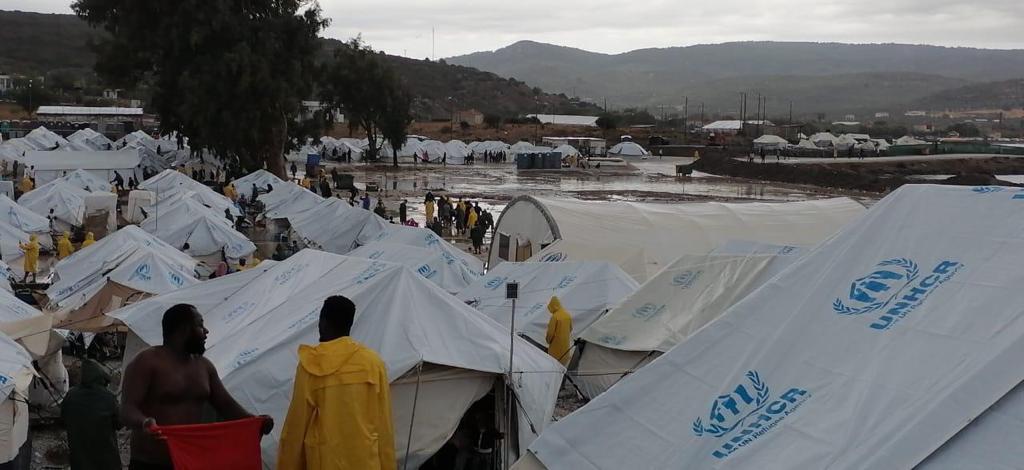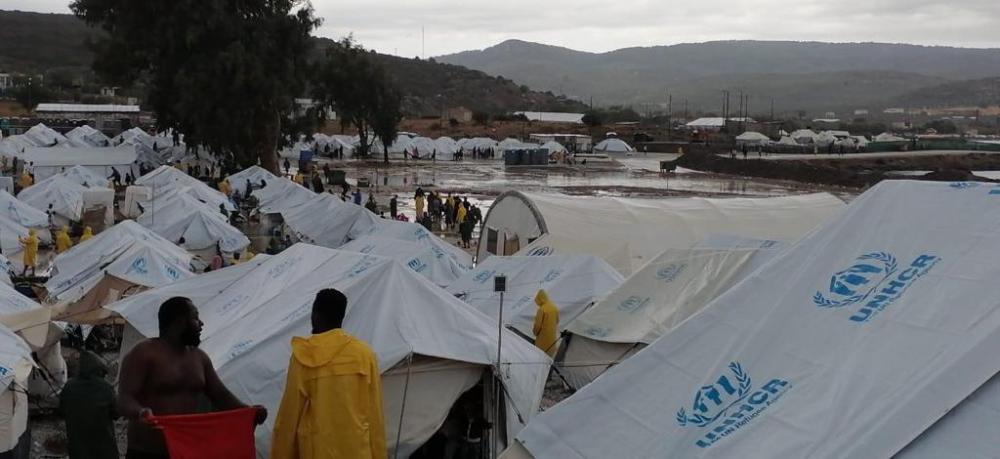Moria 2.0 & Attacks on Solidarity and Dignity
The Intensification of Necropolitics and Dehumanization
Mytilene, 26 October 2020 | by Salim Nabi - borderline-lesvos | Download the full report
Moria 2.0 - the entire camp swamped by water after rain
The Enlightenment philosopher, Immanuel Kant, believed that one could, at least philosophically, show how freedom was possible; that possibility, however, entailed a deep responsibility. Kant uncovered that while as agents and acting beings we can always choose what pleases us, freedom, nevertheless, means that we take responsibility for our actions, for our ways of being and living. Freedom is characterized by the capacity and willingness to impose laws upon oneself. And precisely that is what European freedoms lack today, namely: Europe fails to take responsibility for its actions and policies, and the consequences these have on the lives of people.
Six people arbitrarily arrested after the fire in Moria
After the numerous days of fire in the largest refugee camp in Europe, Moria, six young Afghans were arrested with the accusation of being the arsonists. The arrests and the accusations were based on the testimony of a “community leader” from an ethnic group that has historical animosity toward the ethnicity of the accused. According to the lawyer of the accused there is no more evidence than the testimony of the community leader. However, the young people, at least three of whom are minors, received the harshest treatment: up to six months of prison prior to their trial. According to one human rights observing lawyer on the island, even the state prosecutor was surprised that this applied to the unaccompanied minors, too, for generally minors are exempted from pre-trial detention. But it goes without saying that the arrests, interrogation, and the pre-trial detention were highly politically charged as the state sought a quick solution to the question of the arson.
In the meantime, BBC published a short documentary that attempted to dig further into the cause and source of the fire. A group named ReFocus which provides video and photography training for refugees in order to enable and empower refugees to report on their situation as opposed to the highly biased mainstream media outlets was interviewed by the BBC. The documentary sheds a new light on the sources of the fire: it turns out that alongside some refugees, some locals may have been also involved in the arson.
The documentary went, more or less, viral, in response to which two of the ReFocus students have been harassed by the police in the camp, and one of them was ordered to attend the court in Mytilene for interrogation. In a brief conversation I had with him, the young man who was ordered to attend interrogation at the court told me that most of the questions concerned as to why he involved the local population. Moreover, he felt highly threatened for having expressed his views and for having provided the BBC his footage and description of the fire. In his words: “I feel that I am being terrorized for having exercised the freedom to speak what I know.” It is unknown if there will be any charges pressed against the two young men and the ReFocus group, but it is clear that the documentary exposed the rush and, perhaps, inaccurate accusation of the state;
it also showed that the arrests had more of the character of public relations campaign then rigorous investigation into the source and cause of the fire.
On the other hand, after the fire refugees were stranded for days, some up to seven days, on the streets that were sealed and blocked by the riot police between Kara Tepe and Moria, while West of Moria camp there were local far-right vigilante group having their own road blockade that was ignored by the police and the authorities. After the fire of Moria, a new hell was taking place for the refugees. Then, as the new camp was being constructed in Kara Tepe, the authorities used various techniques to force the refugees to move to the new camp. The Ministry of Migration was using social media and other means to threaten the refugees with the cancellation of their asylum cases if they did not register in the new camp, while refugees – after 6 months of lockdown in Moria – were afraid that the new camp would be a closed camp. What remained of the refugees on the road were eventually kettled by the riot police (MAT) into the new camp.
Moria 2.0
The Greek government of Prime Minister Mitsotakis prided itself for the fast construction of the new camp; aerial footages, using drones, were aired on all mainstream media outlets as well as the official government websites and social media accounts; the UNHCR, too, used footages of the new camp to fundraise, while in the background of the man speaking one could see summer tents that the UNHCR uses for African and Middle Eastern setting, i.e. warm and dry climates; the tents did not seem to have anything beneath them, which made everyone wonder if the people will have to live on bare soil. The camp had no showers, very few mobile toilettes, and lacked all sanitary capacity to prevent the spread of Covid-19. Moreover, the camp is located on a piece of land next to the sea, which means that the humidity is much higher than in the former Moria camp. People on the ground were very clear about the prospects of the rain season that lied ahead, but both the Greek government and the UNHCR maintained their focus on advertising their master work.
Then came the first heavy rain; the entire camp was swamped by water, overflown tents, massive lakes formed inside the camp that prevented access to the few mobile toilettes and garbage bins.
A week later the second heavy rain drowned the camp, again. And the statement of the Ministry of Migration, on their official Facebook page, assured everyone that the work is proceeding with a “steady pace”, whatever that may mean in this context. And until now there has been no appropriate preparation for the upcoming winter, which is rich in heavy and prolonged rain, cold temperatures and high levels of humidity.
Illegal push-backs by Greek coast guard and FRONTEX
In the meantime, the Greek government has been operating a de facto policy of push backs, which it is intent on covering up by accusing and investigating any border, pushback, and human rights observations. The recent publication of a report by Spiegel uncovered that the Greek coast guard and FRONTEX are involved in illegal pushbacks, which puts the latest accusation of the Greek government against border monitoring groups in doubt, and makes one wonder as to what extent the witch-hunt against solidarity and human rights observers is motivated to cover up the blatantly illegal acts conducted by the Greek Coast Guard and FRONTEX.
The freedoms, including economic prosperity, which Europe has enjoyed for a long time now have come at the cost of people in the rest of the world; refugees have emerged precisely as the result of centuries of European policies toward the rest of the world.
If today we have African and Middle Eastern refugees arriving in Europe with the rightful and just demand for the right to life, it is only so because Western policies have made life impossible in these vast swathes of land where these people come from. And if we follow the Enlightenment’s definition of freedom, then Europe has not been free; on the contrary, Europe has failed to live up to the definition of freedom provided by its own “Enlightenment”. It has enjoyed its pleasures without taking the responsibility for its actions.
And what Lesvos and the rest of the Mediterranean demonstrate is that, today, “European freedoms” come not only at the cost of peoples in Africa and the Middle East, but also at the cost of the life of those who flee the circumstances that European policies have created. It comes in the form of drownings in the sea, in the form of pushbacks, in the form of dehumanization exercised in the camps, and last but not least, in the form of the witch-hunt conducted against those who try to exercise freedom, who understand that in order to be free one has to take responsibility for the consequences of one’s freedoms and pleasures. Only a pathological and psychotic human enjoys their pleasures and fantasies at the cost of the welfare and life of others. A free person is free only insofar as they enjoy their lives with respect for the right and space for the lives of all others, for all life.
Today, European and Western policies toward other peoples and the planet resemble, one-to-one, the behaviour of a pathological and psychotic serial killer who wants to live their fantasies at the cost of the lives of others. And when the Greek government has been threatening the only refugee facility with closure and eviction, which provides its residents with a dignified human existence, a dignified shelter and life, namely PIKPA, then we cannot categorize these actions and policies otherwise; they are policies riddled with pathologies that are worlds apart from the meaning of freedom.
Read also Salim's first report: Ashes of the failure of European Humanism
Solidarity statement: The EU and Greek state are guilty – Solidarity with the imprisoned after the fire in Moria!


